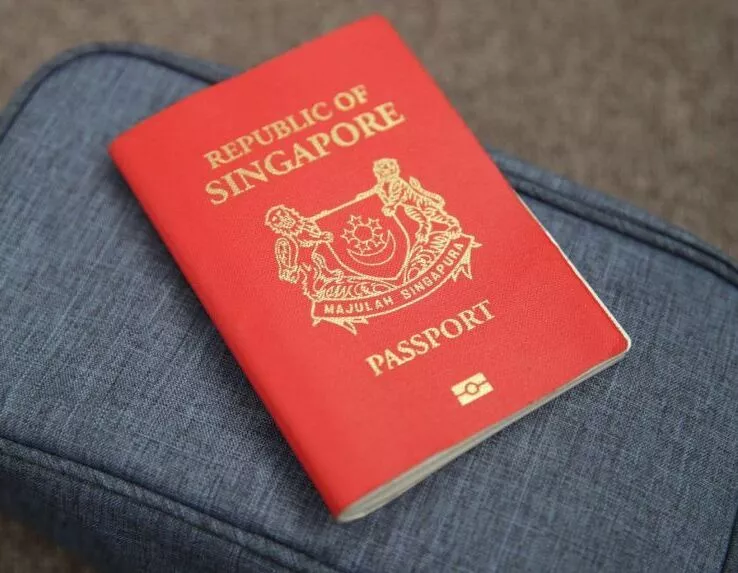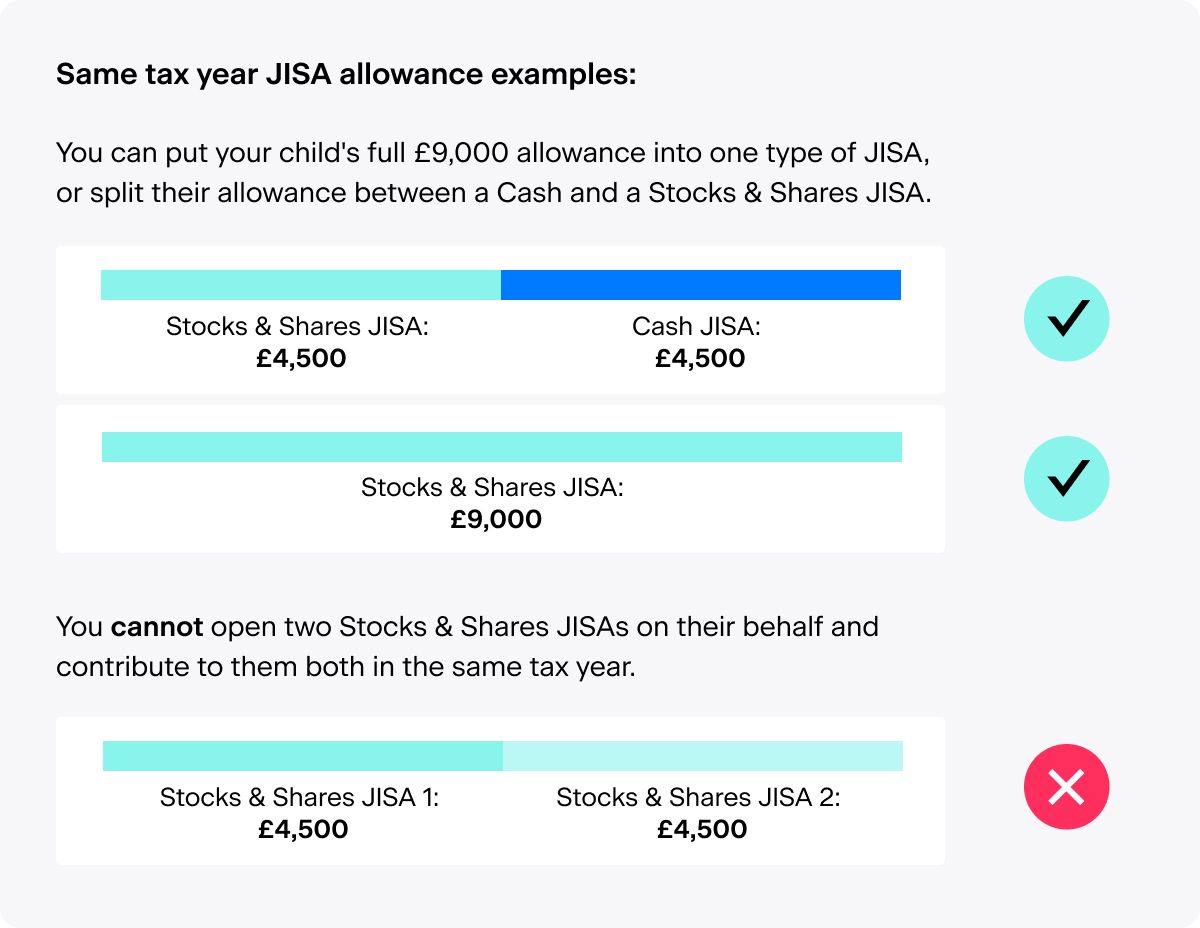What is a Junior ISA (JISA)?
A Junior Individual Savings Account (or JISA) is a great way
to save for your child’s future. A JISA lets you contribute
up to £9,000 a year without paying any tax on the interest
and returns. Once it’s added, the money belongs to your
child, but they can only withdraw it when they turn 18.
In this guide, we explain everything you need to know
about a JISA, including some of the main benefits and
options, and whether these accounts are right for you
and your child.
Stocks and Shares ISAs usually offer higher returns on
your money than Cash ISAs, as your savings are invested
in the stock market. Instead of earning money only
through interest, gains from Stocks and Shares ISAs also
come from investment growth (i.e., how well your stocks
and shares are performing). However, that means that the
value of your child's investments can go down as well as
up, unlike a Cash ISA.

What is a Junior ISA (JISA)?
A Junior ISA account is a tax-efficient savings
account for UK residents under 18 years old.
They work similarly to adult ISAs, letting you save
money without paying capital gains or income tax on
any interest or returns your child receives. But the
obvious difference is that JISAs are only for people
who are not yet of adult age and must be opened by a
parent or legal guardian.
Once opened, the money belongs to the child. This
means you as a parent can pay money in (up to the
annual JISA allowance of £9,000) but you can’t make
withdrawals.
Once your child turns 16, they can take control of
the account and add money if they want to. They
won’t be able to withdraw funds until they’re 18,
though. At this age, their JISA will automatically
convert into an ISA and they can transfer or
withdraw funds as a lump sum.
Just like an adult ISA, Junior ISAs are protected
(up to £85,000) by the Financial Services
Compensation Scheme (FSCS). As long as your provider
is registered with the Financial Conduct Authority,
like APL, their money is protected in the unlikely
event that their provider encounters any financial
problems.
There are two main types of Junior ISAs. Your child
can have one or both types in their name at any one
time, and we'll explain more about the rules around
these later in the article:
. Cash Junior ISA: A Junior Cash
ISA works like a regular adult Cash ISA. It’s
similar to a standard savings account, however, you
don’t pay tax on any interest you receive. In the
case of a JISA, the money is locked away and can’t
be withdrawn until your child turns 18.
. Stocks and Shares Junior ISA:
Like an adult Stocks and Shares ISA, this account
lets you invest in stocks, shares, bonds, and
investment funds. This means your returns are tied
to the performance of your investment portfolios,
rather than a set rate of interest.
Stocks and Shares ISAs usually offer higher returns
on your money than Cash ISAs, as your savings are
invested in the stock market. Instead of earning
money only through interest, gains from Stocks and
Shares ISAs also come from investment growth (i.e.,
how well your stocks and shares are performing).
However, that means that the value of your child's
investments can go down as well as up, unlike a Cash
ISA.
With a Stocks and Shares Junior ISA, you’re also in
complete control of your investment style. If you’re
interested in impact investing (i.e. investing in
sustainable and ethical projects and organisations),
this is a great choice. At APL, our funds are only
made up of companies actively making the world a
better place. That means you’ll know your child’s
JISA is doing good while you save for their future.
Whichever type of Junior ISA you choose, your child
won’t pay UK Income Tax or Capital Gains Tax on any
returns within the JISA limit.
How much can you invest in a JISA each year?
For the current 2023/24 tax year, the annual
Junior ISA allowance is £9,000. This means you
can only invest up to £9,000 in your child’s
account each year.
If you’ve opened both a Cash JISA and a Stocks
and Shares JISA, you can either pay the full
JISA allowance of £9,000 into just one of these
accounts or balance the amount between the two.
Here’s an example:
. In the 2023/24 tax year, you put £4,500
into your child’s Cash Junior ISA
. This means you can only put up to £4,500
into your child’s Stocks and Shares Junior
ISA in the same tax year.
. You'll then be at the Junior ISA limit
for the year (£9,000).

Will a JISA affect my own annual ISA
allowance?
As a parent or guardian paying into a
JISA, the £9,000 annual JISA allowance
doesn’t impact the amount you can put
into your ISA accounts.
Your annual ISA allowance will
remain at £20,000
(the upper limit for the current tax
year).
Who can get a Junior ISA?
To open a Junior ISA, your child must be:
. Under 18
. A UK resident
If your child isn’t resident in the UK, you can
only open a JISA for them if:
. You’re a crown servant (for instance, someone
working in diplomatic or overseas civil services, or
in the UK military).
. Your child depends on you for your care.
If your child moves abroad after you’ve opened their
Junior ISA, you (or other friends and family
members) can still add money to the account.
Just remember, the account is in the child’s
name, not yours. This means you can’t withdraw
money, but you’re still the responsible account
holder. This is known as a “registered
contact”.
Money in a JISA can’t be withdrawn until your
child’s 18th birthday. There are some
exceptional circumstances though.
If you have a Child Trust Fund (we’ll cover these in
more detail), you can’t have a JISA at the same
time. You’ll need to transfer your trust fund into a
JISA with your chosen provider.
Can I open a JISA for my grandchild?
You don’t have to be a child’s parent to open a JISA
on their behalf, but you do need to have parental
responsibility for them. So if you’re grandparents
or other legal guardians with overall
responsibility, you can open a JISA on the child's
behalf.
While you can’t open a JISA as a grandparent, you
can contribute to one once it’s open. All you have
to do is send money by bank transfer to the JISA
account.
Is it a good idea to transfer a JISA to a Child
Trust Fund?
JISAs and Child Trust Funds are reasonably similar,
but here are a few aspects to consider when deciding
if switching is right for you.
. JISAs are often easier to manage and can
offer more transparency.
With a JISA with APL, for example, you can see
exactly how much your child’s savings are worth. And
you can add money simply through our app.
. You have more control over your investing
style.
Junior Stocks and Shares ISAs are particularly
useful for ethical investing, giving you control
over which companies and funds your money supports.
That’s not usually possible with a CTF.
. JISAs may be more affordable.
JISAs normally offer lower fund manager charges and
fees than CTFs. This may not be the case for
everyone though, so check both your current and new
account fees before making any decisions. Transfer
fees might also apply when transferring from your
existing CTF.
. Both account types have the same tax
rules.
Both CTFs and JISAs have the same annual allowance
(letting you contribute up to £9,000 a year). Money
earned is also tax-free, including capital gains and
interest payments. So whichever account you go for,
you’ll enjoy the same tax benefits.
Save for your child’s future with a Junior ISA from
GLOBAL PORTFOLIO LTD
Ready to start saving for your child’s future? A
Junior ISA is a convenient and tax-efficient way to
put money aside for your child. You can add up to
£9,000 a year that they’ll be able to access once
they’ve reached the age of 18.
Sign up to GLOBAL PORTFOLIO LTD to open a JISA and
start saving for your child’s future today.

